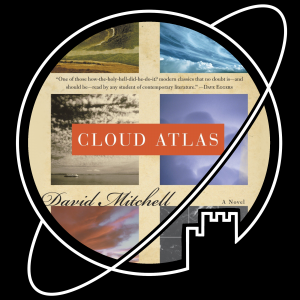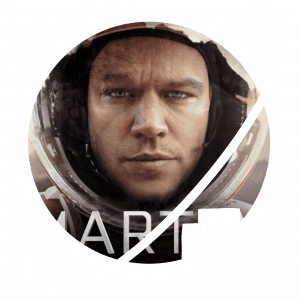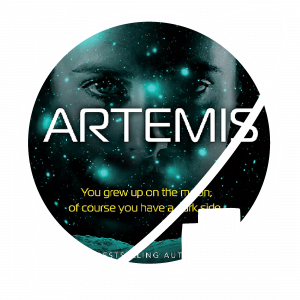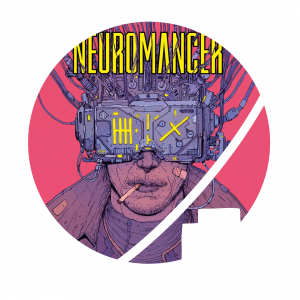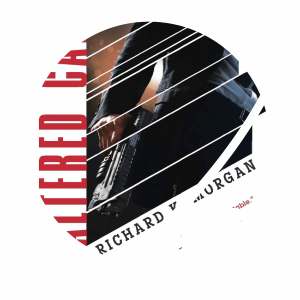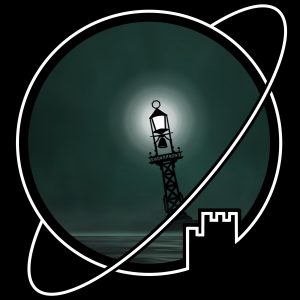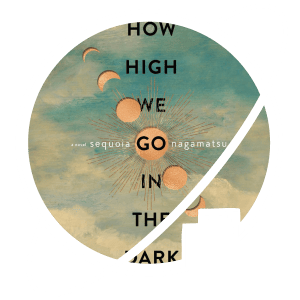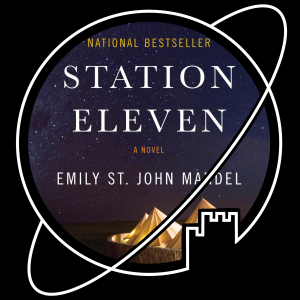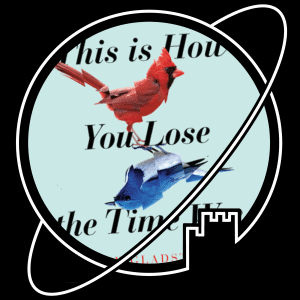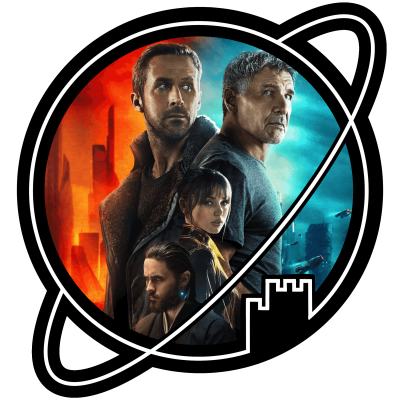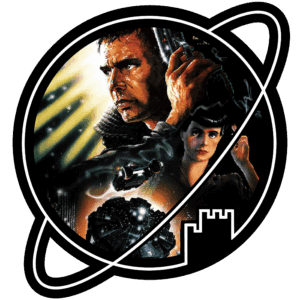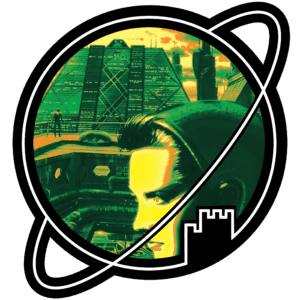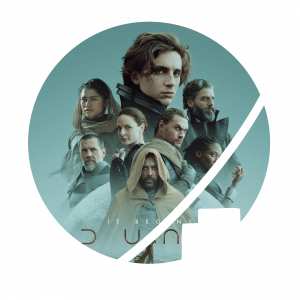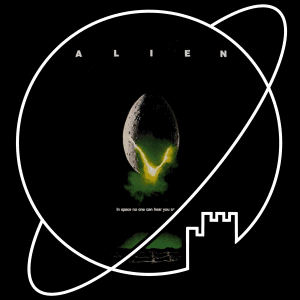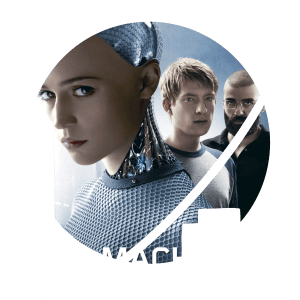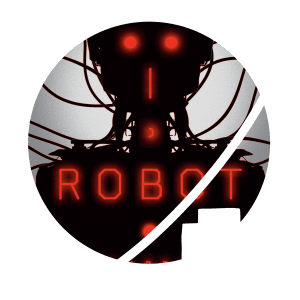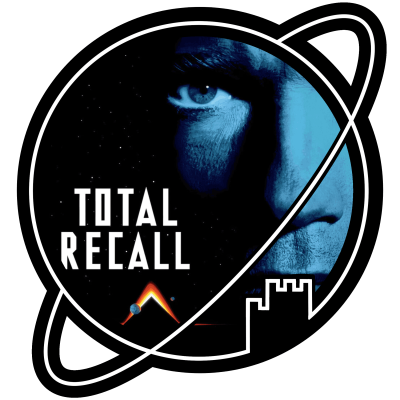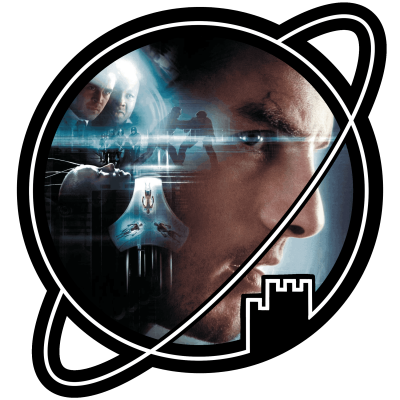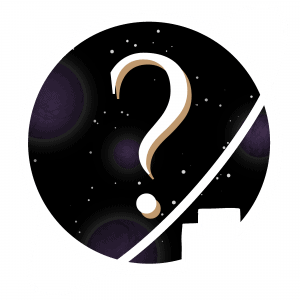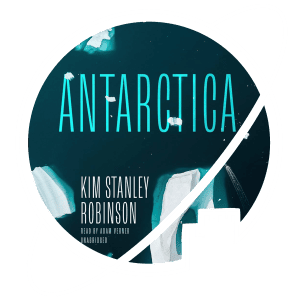A curated Collection of Fantasy and Science Fiction Media
- Novel written by David Mitchell
- Published 2 September 2014
- Standalone
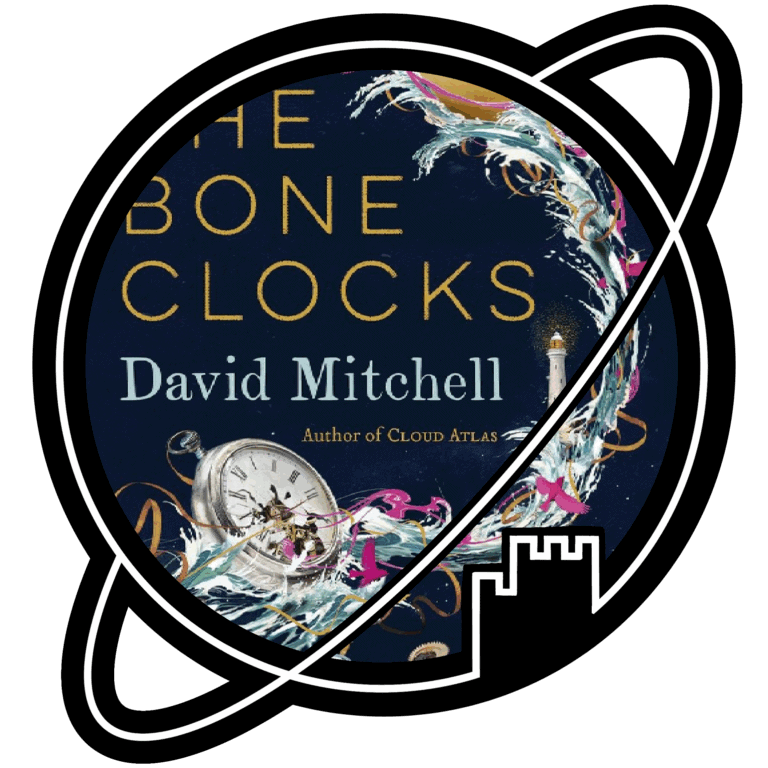

I am an absolutely massive David Mitchell fan, and for some reason that put me off reading The Bone Clocks for literal years, not because I didn’t want to, but because for some reason the time never felt ‘right’. It took me a moment of realisation to get over that and just grab it to read om my commute.
And of course, it was amazing!
Like we have come to expect from David Mitchell, The Bone Clocks is a genre-hopping (mostly) urban fantasy book with several layers of mystery.
Part of what makes this book so great is that it starts slowly, with the supernatural merely a suggestion. As the story develops and the characters and point of view shift, that weird scene at the end of the previous story slowly fades into the background – and both the reader and the character themselves start questioning the main character’s sanity.
But as Mitchell dips in and out of the supernatural and the fantasy elements become more real, the reader realises this is not just a literary story with some magical elements but a full-blown urban fantasy.
I can’t add much more detail without risking spoiling the story, but it soon devolves into an occult war with a butter soft magic system but really cool jargon.
Remember though, this is still David Mitchell. So despite all the genre-fiction going on in the background, most of the story is more about the characters than the plot, which only takes centre stage in a couple of chapters.
And, again, as we expect from Mitchell, the characters are diverse and their stories varied, from a rebellious teenage girl to a war correspondent, from a posh student to a has-been writer. And, of course, as we expect from Mitchell, their stories are expertly interlinked.
And that isn’t even all yet.
To top it all off, the final section of the book presents an (almost) stand-alone post-apocalyptic story that is so good that I almost wonder whether it could not have been material for a book on its own – the world-building is superb, especially for how short the section actually is.
Overall, I am absolutely kicking myself for not reading The Bone Clocks when it was originally released. It is one of the best books I have read in years, and if it is not on your list you are definitely missing out.
Tagged:
See also:
- Book written by Andy Weir
- Published in 2021
- Standalone


I can’t believe I didn’t pick up this book sooner. I really enjoyed The Martian, and I also read Weir’s second book, Artemis. I didn’t review Artemis, so I couldn’t tell you exactly how I felt when I’d just finished it, but I believe my opinion was somewhat similar to Peter’s: a fun book, similar to The Martian but not as good.
So then the question is: was the Martian just a one-off? Can Weir escape the legacy of his publishing debut? I’d say the answer is yes. But also no. Let me explain.
Project Hail Mary is in many ways extremely similar to The Martian. We follow a stranded space traveller on a mission to save planet Earth. He’s the only survivor on his spacecraft, and throughout the book, he’s faced with challenges that he has to solve through his own creativity and (of course) ridiculous level of intellect.
Is Weir just repeating what he’s been doing all along? Yes. The problem is that he just does it really, really well. As far as I’m concerned, if he can keep cranking them out at this level of quality, I will read every book about a lone space traveller solving problems that the man wants to write.
Weir’s writing is so fun that I don’t even care that all his protagonists are essentially the same person. The only thing he doesn’t write super well are the scenes back on earth. You can tell he’s just not that comfortable writing scenes with more than one type of character (smart, sassy man), and the other characters tend to fall a little flat. Fortunately, he more than makes up for this with the character of Rocky. I will not elaborate further. Read the book. You will understand.
Project Hail Mary is easily better than The Martian. I cried actual, genuine tears while reading this book.
- Novel written by Ken Liu
- Published 9 October 2025
- Apparently the first part of a planned series on Julia Z
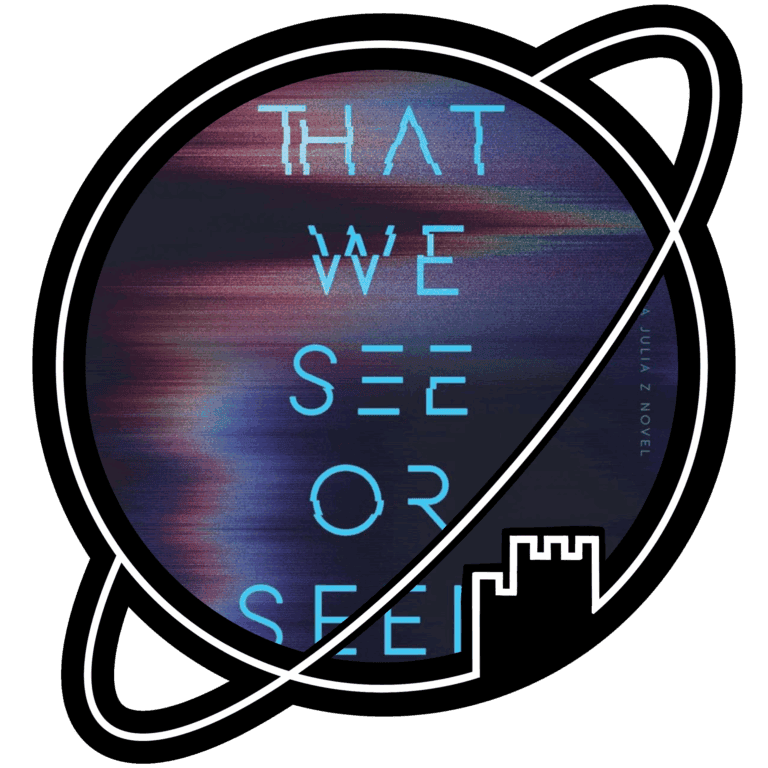

Listened to the audiobook with Kat Cleave – fine narrator.
I really liked The Paper Menagerie, so I was keen to try out some of Liu’s longer work. When The Grace of Kings disappointed, I chalked that up to the fact that it felt a little like an overreach – an attempt to squeeze an incredibly complex period in Chinese history into a fantasy setting. It read like Liu was trying just a little too hard to write a magnum opus. I figured that was a fluke and I was glad to find that Liu returned to sci fi for All that we See or Seem.
Only to find that his latest novel fell flat for me too.
The pitch is good, if a little generic – a loner with a skillset that wants to be forgotten by the world is pulled into One Last Case. The ‘twist’ here is that our loner is not a jaded, white, male, detective, but rather a young woman hacker.
Unfortunately, the story that spins from the prompt failed to excite me.
Part of the reason must be that the characters didn’t come alive. Perhaps the characters felt so flat because it appeared to me Liu was more excited about showing off his research into near future tech ideas than fleshing out his characters. Admittedly, there are a number of thought-provoking nuggets in his descriptions of technology. However, his dystopian vision of our near future – while not at all improbable – feels like it lacks imagination. And even though it hogs the limelight, frustratingly, it never feels like it is central to what is going on.
Liu’s focus on explaining the details of AI hacking or phone data tracking comes at the cost of developing, for example, his villain. Cartoonishly evil and without any form of motivation or background, his largest contribution to the novel are his phone calls to his equally generic goons.
The villain is not alone in this. My suspense of disbelief was thoroughly tested by a number of other moments that felt straight out of a cartoon. From improbable puzzles to listening in on the bad guys’ poorly scripted video game dialogue, from analysing company policy for determining what car to steal to analysing in what pot of food to hide one’s drone, All What We See or Seem is plagued by regular sections of underdeveloped prose that an editor should have taken an axe to.
Overall, All That We See or Seem is just the umpteenth cyberpunk noir that focusses on exploring a drab near-future dystopia over its own characters or message. My conclusion is that I should probably stick to Ken Liu’s short form fiction.
Tagged:
See also:
- Novel written by H.G. Wells
- Published in 1896
- Standalone


Listened to the audiobook with George Griffin – well read.
The Island of Dr Moreau is some of the very earliest works of science fiction ever, and honestly, it didn’t quite click for me.
The story is really simple: a cast away washes ashore on an island that is home to a race of strange human-animal hybrids, that turn out to be sutured together by a mad scientist that is trying to prove a point. When his influence over them wanes, they revert – some more slowly than others – to their animal nature, and the protagonist has to flee the island and get back to the world of men.
If I were brutally honest, I would say that that is a plot on the level of a children’s comic book.
Now, of course, the we should not forget that this novel was published in 1896. The mad scientist might have found his origin in The Island of Dr Moreau (to those of you who would accuse Victor Frankenstein of starting this trope instead, I challenge you to read the book!). So we need to cut Wells some slack.
But even with a lot of slack, I feel The Island of Dr Moreau doesn’t really rise much above the level of a simple adventure story.
Perhaps the idea of vivisecting and rebuilding animals the way Moreau does in this novel was an interesting or even vaguely plausible science fiction concept in 1896, but 130 years later it strikes the reader as rather fanciful.
The science fiction and the plot might be a little simple, but Wells wouldn’t be famous over a century down the line if he weren’t a good writer. There are certainly parts of The Island of Dr Moreau that prove that.
The best element of the story is probably the struggle of the beast-men to retain their human side. Made to be more than beasts, they are proud of their humanity and want to remain rational. But the moment their strict regime breaks down, they start reverting to their animal habits despite themselves.
I found that idea – that you may reshape an animal but that it will always revert to its nature – a sad but nevertheless thought-provoking message. It underlines Moreau’s hubris and his cruelty in making these animals something they are not.
In the end, I am happy to have crossed a classic like The Island of Dr Moreau off my list, but I am not sure this is a book that I would recommend to 21st century readers. A cornerstone of the genre, perhaps, but one best appreciated in its foundational role not examined individually.
- Novel written by Emily St. John Mandel
- Published 2022
- Standalone, loosely connected to The Glass Hotel
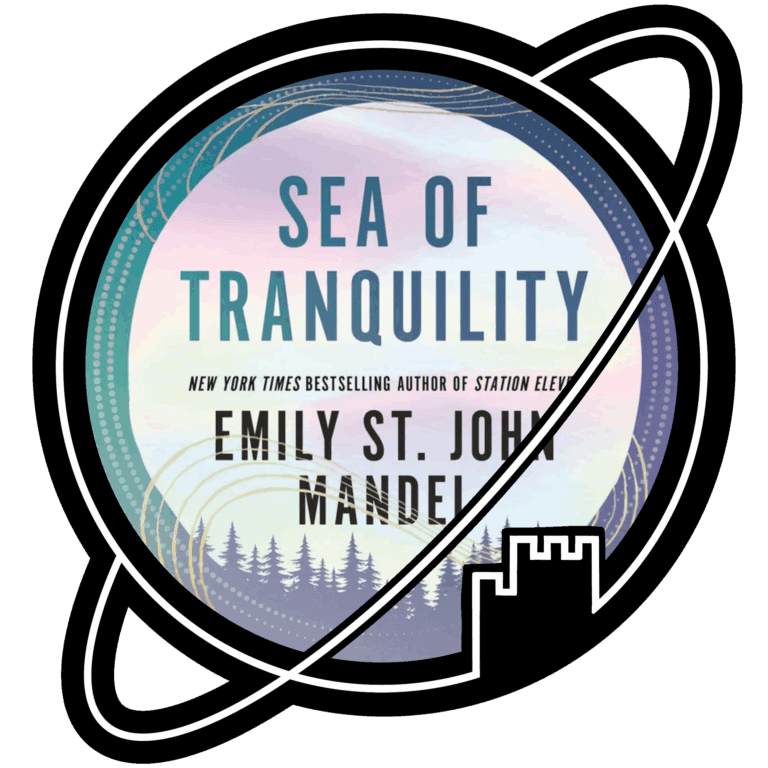

Listened to the full-cast audiobook with Kirsten Pitter, Arthur Morey, John Lee, and Dylan Moore. Well read, though perhaps this was not the book that was improved most by the full cast performance.
Borderline 2,5-3 stars. The bottom line of this review is that I did not not enjoy my time reading Sea of Tranquility but I also read it a couple of weeks ago and I already forgot that I did – I only remembered when I saw I noted it on my to review-list.
Sea of Tranquility is the kind of novel that I could have really loved. It has a time travel plot that is neatly slotted together (if not particularly sophisticated or unexpected), with interlinked and intertwined stories – that is the kind of book that tickles my fancy.
And there are other positives too – the book is character and emotion focussed and even though the separate stories mean that you don’t spend as much time with each of the characters as you might in another novel, I connected with them well. The prose is atmospheric, good at establishing a vibe in all the scenes.
On the other hand, it all remains pretty vague.
For example, the book takes place over different timelines and geographic locations, but I feel the effort to differentiate them fell a little flat. The one person we properly meet in 1912 happens to be the one who opposes colonialism, so we St John Mandel never really needs to portray a true denizen of the antebellum and get into their mindset. When we get to the 2200’s, the characters are still discussing sexism and the division of task in raising children between husband and wife.
I am not saying that those might not have been or might not be topics of discussion in those far away times, but it is obvious that these are discussions from today that are projected on distant characters with no apparent effort to place them in their (imagined) context.
The same goes for the small details of worldbuilding. Are people going to be doing a physical book tour selling physical books in the 2200s? Is it ever really going to be feasible to commute from the earth to the moon? Why are people traveling in time to begin with again?
All in all, the strongest sections of Sea of Tranquility are those taking place in the here and now, where the relatively mediocre sci-fi elements don’t get in the way of enjoying a good emotion-driven scene.
In conclusion, I am on the fence. At its best, Sea of Tranquility is a nice atmospheric and emotional drama, with a properly designed if a little cliché time-travel puzzle on top. At its worst, Sea of Tranquility is a poorly executed Cloud Atlas-clone that doesn’t get what makes that book so impressive. Make of that what you will.
Tagged:
See also:
- Movie directed by Denis Villeneuve
- Based on Do Androids Dream of Electric Sheep by Philip K. Dick
- Starring Ryan Gosling, Ana de Armas, Harrison Ford, Sylvia Hoeks, Robin Wright, and others
- Released 6 October 2017
- Runtime: 163 minutes
- Sequel to Blade Runner

I don’t think its a secret that I am a big fan of Denis Villeneuve. I love how his sci-fi movies focus on slower scenes and visuals. I love how good the visual design is his movies. It is exactly what I want from sci-fi cinema: high production value, great visuals, ideas beyond the action.
It’s no different in Blade Runner 2049. I think picking Villeneuve to revive this 40-year-old-franchise was a great choice. His style fits with Ridley Scott’s original Blade Runner very well: the same slowness to it, the same focus on visuals.
I think the visuals of 2049 even improve upon the original. It might just be that filmmaking has come a long way since the 80s, but 2049 is just a little more polished. The establishing shots, the contrast between clean and clutter, the coloured lighting, the focus on the rain – everything seems just a little more refined.
Blade Runner 2049 does lose a lot of the weirdness that was in the original and replaces it with more gravity. But I don’t mind. I have always found the weirdness of the original Blade Runner a little off-putting – it was the one thing you hoped people could get over when you sat down with them to watch the movie. And a movie as good as Blade Runner 2049 is allowed to take itself a little seriously.
Like the original, 2049 asks the viewer what makes a character human and what separates them from the replicants, focusing not on empathy but on love and on memory. Interestingly, by introducing the memory-element, 2049 actually nods another of Dick’s stories, We Can Remember It For You Wholesale.
One area where 2049 loses out to the original is in moral ambiguity. There is more than enough in 2049 that the viewer can wonder about. But the original Blade Runner left it up to the viewer to decide who were the good guys and who were the bad guys, and it adds a layer of depth to that movie that 2049 (and even Dick’s original Do Androids Dream of Electric Sheep) is missing. In a way, 2049 is more traditional Hollywood that way: the actions scenes are action filled and you know who you’re supposed to root for.
So movie is not quite perfect – I don’t like Jared Leto’s performance (I didn’t find his gravity credible), I am not a huge fan of K and Deckard’s fist fight and I think the water action sequence at the end is a little too long. I wonder whether the android revolution theme introduced in 2049 is the right hook for a sequel. But those are minor points in a movie that also has shots that take your breath away, and character moments that wrench your heart.
I think Blade Runner 2049 is a great movie. It looks gorgeous and it oozes emotion, it has a coherent story with enough depth that it keeps you engaged, and it is paced at a leisurely cruise that allows you enough time to process it.
For me, Blade Runner 2049 showcases the perfect style for a big-budget Hollywood blockbuster. So free up an evening this week and join me on the Denis Villeneuve bandwagon!
Tagged:
See also:
- Movie directed by Ridley Scott
- Based on Do Androids Dream of Electric Sheep by Philip K. Dick
- Starring Harrison Ford, Rutger Hauer, Sean Young, and Edward James Olmos
- Released 25 June 1982
- Runtime: 117 minutes
- Followed by Blade Runner 2049

Blade Runner is undeniably one of the most influential films in sci-fi. Arguably, it is one of the two pieces of media (alongside Neuromancer) that launched cyberpunk as a genre. It is praised into high heaven by Reddit nerds and successful directors alike.
That begs the question: is it any good?
I would argue that it is, but if you disagree, I can’t really fault you.
Blade Runner is a surprisingly slow and surprisingly weird movie to have gained such prominence. For a movie supposedly about a bounty hunter tracking down his targets, it defies expectations by focusing on visuals and conversations basically all the way until the last sequence between Deckard and his final prey. That final action scene is a series of quick bursts of action interspersed with dialogue and tension – and the rare action sequences we do get before that are more confusing and crowded than exciting.
‘Confusing and crowded’ is actually also a good way to describe Blade Runner’s visual style. The screen is constantly filled with clutter, be it on the crowded streets or in Deckard’s apartment. In many of those scenes, I would find myself trying to figure out where to look, constantly a little distracted from the scene’s focus by all the other things going on in the background – if Scott doesn’t explicitly place those ‘things in the background’ center shot.
But that slowness and weirdness is likely also why Blade Runner still hits home after more than 40 years. It was never intended as flashy and clean, and so it didn’t age half as poorly as a more conventional version of the story might have.
And so Blade Runner takes the time to develop Deckard’s relationship with Rachael and to showcase Sebastian’s dusty apartment full of mechanical marionets. And in doing so, it raises interesting questions: How does one distinguish between a human and a machine? What essential quality separates them?
Those are questions that are not dissimilar to those Dick asked in Do Androids Dream of Electric Sheep, though in Dick’s version of the story it is never in doubt that empathy is that quality. Blade Runner is an adaptation that takes some liberty, but I don’t mind the ambiguity Scott introduced. A movie has less space to delve into diverse themes than a novel. Scott chose to focus on one of them, and to leave the viewer more space to come to their own conclusions.
So I like Blade Runner, but I do think it might put some people off. Still, it is such a classic – why not give it a shot?
Tagged:
See also:
- Novel written by Philip K. Dick
- Published 1968
- Standalone
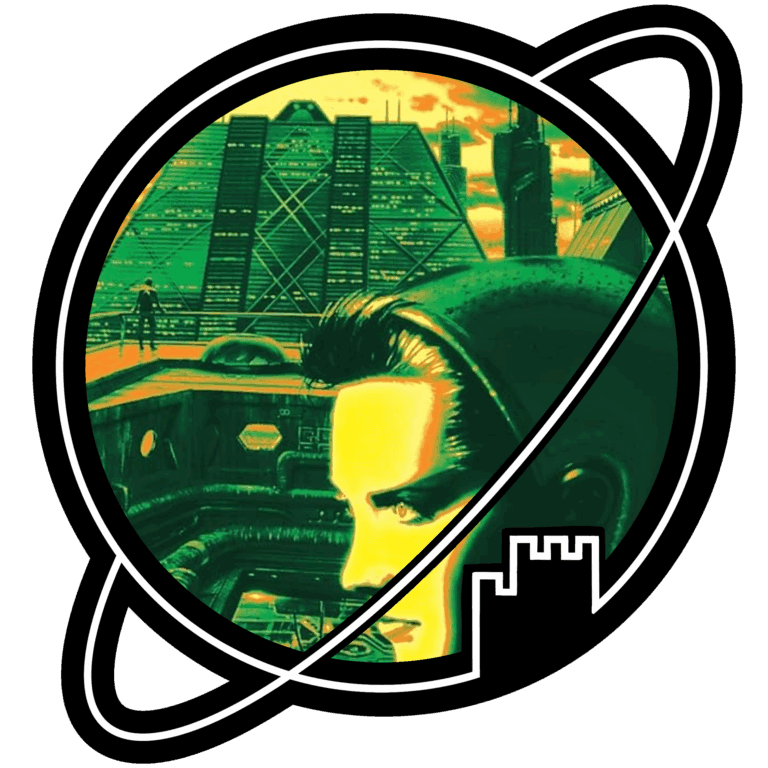

I have a bit of a love/hate relationship with Philip K. Dick, where I really want to like what he writes but I often struggle to just a little actually enjoy reading his work.
Do Androids Dream of Electric Sheep fits that picture very well.
In Do Androids Dream of Electric Sheep, Dick creates an interesting world, with a history, religion, a crumbling society – all with a few throwaway lines. I have praised a sci-fi writers’ ability to do this at length and it was one of the reasons I enjoyed Neuromancer so much.
Moreover, Do Androids Dream of Electric Sheep has a surprising amount of depth. It revolves around the real versus the fake, around human empathy, and around the distance created between people by artificial distinctions.
A good example of this depth is the fact that all humans are supposed to demonstrate their empathy by caring for an animal. But since these are so expensive, some have a ‘fake’ electric animal instead (a source of great shame, and thus kept secret). Nevertheless, the humans love these electric animals with all their heart as their society and religion requires of them. But when it comes to ‘fake’ humans – the androids – humans are supposed not to have a shred of feeling for them. It is this paradox that the protagonist Deckard is struggling with.
And that is a great theme! Do Androids Dream of Electric Sheep just feels a little like Dick went into it without too much of a plan. As a result, there are poignant moments, but not a particularly strong overarching structure. There are great ideas and little vignettes, but some of these are discarded after use in a single paragraph.
Most importantly, however, is Dick’s prose, which is best described as very blunt. I don’t need flowery prose to enjoy a story, but in Do Androids Dream of Electric Sheep, I found Dick’s presentation rather jarring at times.
In a book that revolves around empathy, Dick leaves basically all of the feelings to the reader. That has advantages – the reader is free to project their own thoughts and feelings onto Deckard and his wife and to judge their relationship by those standards.
That also means, however, that Dick has written a novel without much of an actual message, since the reader can basically make of it what they wish. The rather disjointed ending adds to this feeling.
So. I like Do Androids Dream of Electric Sheep. It is full of interesting ideas and has great theme. But I don’t think Dick knocked it out of the park with these ingredients. It makes me wonder what we could have gotten if some other, more empathetic writer had taken Dick’s outline and built a story with it.
Tagged:
See also:
- Movie directed by Paul Verhoeven
- Starring Arnold Schwarzenegger, Rachel Ticotin, Sharon Stone, Michael Ironside, and Ronny Cox
- Released 1 June 1990
- Runtime: 113 minutes

I’m having a really tough time rating this movie in stars, so I would recommend you mostly forget about those and read the review instead.
This is a typical Verhoeven movie, where on the surface its just a mind numbing orgy of violence and some sex, but the more you think about it, the more you realise Verhoeven may have thought about it, too. Allow me to explain.
Let’s start with the bad: a lot of the movie’s runtime is taken up by long, gory action scenes in which Arnold Schwarzenegger violently murders his way through most opposition.
I would describe his acting as downright poor, and he’s not the only one who suffers from wooden dialogue in this film.
I’ve read somewhere that Total Recall was one of the most expensive movies made at the time, but the effects have aged really poorly. That might be because very little thought seems to have been put into the visual style: many of the movie’s sets and props very much look like they’re made out of flat cardboard (probably because they are), and while a handful of scenes do show some nice expansive shots, many more appear to have been filmed in cramped studios. The lighting is flat and there is just a weird amateurish air to it all.
That sounds pretty bad (and it is), but like other Verhoeven movies, it also feels like it is a parody of itself. It almost feels like it is intended to show the watcher just how stupid and violent Hollywood movies can get.
And if you look at it as something of a satire, a comedy, it actually becomes pretty enjoyable – perhaps not to watch too intently, but good with popcorn and beer for a corny movie night.
But really, there’s even an interesting layer beyond that. I don’t want to give it all away, but from the moment Quail, Schwarzenegger’s character, enters Rekall for his memory-implantation procedure and they select ‘Blue Skies on Mars’, you should start questioning whether what you see on screen is intended to be real. Even at the end of the movie, if you’ve paid any attention, you are left scratching your head.
I don’t think it’s the sick mind-melting mystery that some online fans seem to think it is (though admittedly, any online following of a thirty five year-old mediocre action movie is going to be at least a bit delusional), but it’s a neat twist that shows that Verhoeven’s film is smarter than it lets on.
Overall – if you’re bored some time, give it a shot and see for yourself. Maybe you can’t see past how terrible it is, but if you can, Total Recall is surprisingly good goofy fun.
Tagged:
See also:
- Short story written by Philip K. Dick
- Published 1966
- Standalone


Philip K. Dick is one of the grandfathers of science fiction, and this short story is one of his classics. It’s a bit difficult to review without giving too much away, but I’ll give it my best shot.
Like many of Dick’s short stories, this one is heavily carried by the central concept. In this case, the central concept is the idea that in place of actually experiencing a particular experience, a person could undergo a simple procedure to have a memory of that experience implanted. Note only does this raise questions of whether all of their other memories are real, but additionally, the story asks: if memories can be implanted, can they also be erased?
The concept is a strong basis for the story and interesting food for thought, though as is often the case in these classic stories, the central ideas crowd out character development or world building. I think the story is well-structured, and its double twist works well. I have to say though that I think that Dick has written better prose, and there is some unnecessary casual misogyny that would look very much out of place today.
Overall, it is not a bad story, but not as good as some of Dick’s other works. The central concept of a virtual experience is not near as novel now, though we’ve mostly drifted away from the memory angle in modern fiction. Nowadays, it is probably mostly of interest to people who are curious about the origin of Total Recall, and not the public at large.
Tagged:
See also:
- Movie directed by Steven Spielberg
- Starring Tom Cruise, Colin Farrell, Samantha Morton, and Max von Sydow
- Released 21 June 2002
- Runtime: 145 minutes

The Spielberg movie Minority Report is relatively well known for its visual style, especially the gesture-control computers that John Anderton, played by Tom Cruise, uses at the start of the story.
The film does indeed look very good, and I believe that its style and effects hold up decently well even today, over 20 years after its release.
The plot departs relatively far from Dick’s short story in order to make more room for moments of character drama and interpersonal conflict – which makes sense, given that the short story is short enough for the concepts and ideas alone to keep the story afloat.
The added layer makes the story more relatable (if at times also somewhat convoluted). I will not say that the movie’s emotional moments are particularly strong, but for a sci-fi action movie, they work well enough.
The chase- and action scenes could have been a bit shorter for me, and I would have liked the movie to play up the weird cyberpunk elements just a bit more. Overall, though, I think there is enough interesting sci-fi and enough of Dick in there to keep less action-inclined viewers engaged too.
There are a number of interesting thematic departures between the story and the movie, though. I might need to do a post on Dick adaptations in the near future for more of an in depth-discussion on those…
I’ve never been a fan of Tom Cruise’s acting – I always feel like he is just being Tom Cruise, running around different sci-fi or thriller environments. Minority Report is no different, and I would not say that the acting of the other characters is particularly outstanding. It works, however, and the story, pace and visuals pull you in enough for the acting not to matter too much.
In conclusion, not a masterpiece, but well worth a watch.
Tagged:
See also:
- Short story written by Philip K. Dick
- Published 1956
- Standalone
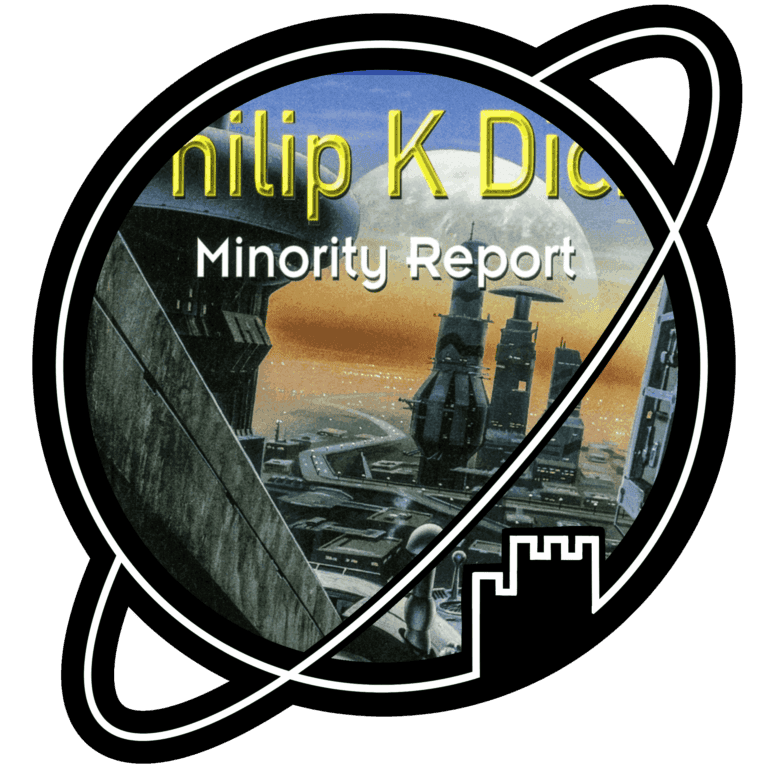

The Minority Report is a classic science fiction story by Philip K. Dick, one of the grandfathers of the genre. As always with these classic stories, it is as much a window onto the time it was written as it is a window onto an imagined future. There are flying cars and off-world colonies, yes, but also punch-card computers and bread trucks.
The story revolves around the idea that three prescient mutants can predict future murders. Their babbling is input into a computer and at the other end, cards containing the names of a murderer and his victim come rolling out. The police go and apprehend them before the crime is committed. The system appears to be working well, until… the name of the chief of the police comes rolling out of the computer.
Against a backdrop of politics, the story then explores whether it is right or legal to lock up perpetrators of predicted crimes that they didn’t have a chance to actually commit, and the meaning and value of the predictions of crimes, if the predictions can paradoxically prevent themselves from coming true.
Like most classic science fiction, The Minority Report is about the concepts more than the characters, and as a short story, the worldbuilding is limited. That may make it a bit of a dry read for the modern audience, but it isn’t too long and well-paced. The concepts are well-thought out, and for those of you interested in stories about time travel and time paradoxes, it is well worth the time invested.
Tagged:
See also:
Privacy Overview
| Cookie | Duration | Description |
|---|---|---|
| cookielawinfo-checkbox-analytics | 11 months | This cookie is set by GDPR Cookie Consent plugin. The cookie is used to store the user consent for the cookies in the category "Analytics". |
| cookielawinfo-checkbox-functional | 11 months | The cookie is set by GDPR cookie consent to record the user consent for the cookies in the category "Functional". |
| cookielawinfo-checkbox-necessary | 11 months | This cookie is set by GDPR Cookie Consent plugin. The cookies is used to store the user consent for the cookies in the category "Necessary". |
| cookielawinfo-checkbox-others | 11 months | This cookie is set by GDPR Cookie Consent plugin. The cookie is used to store the user consent for the cookies in the category "Other. |
| cookielawinfo-checkbox-performance | 11 months | This cookie is set by GDPR Cookie Consent plugin. The cookie is used to store the user consent for the cookies in the category "Performance". |
| viewed_cookie_policy | 11 months | The cookie is set by the GDPR Cookie Consent plugin and is used to store whether or not user has consented to the use of cookies. It does not store any personal data. |








